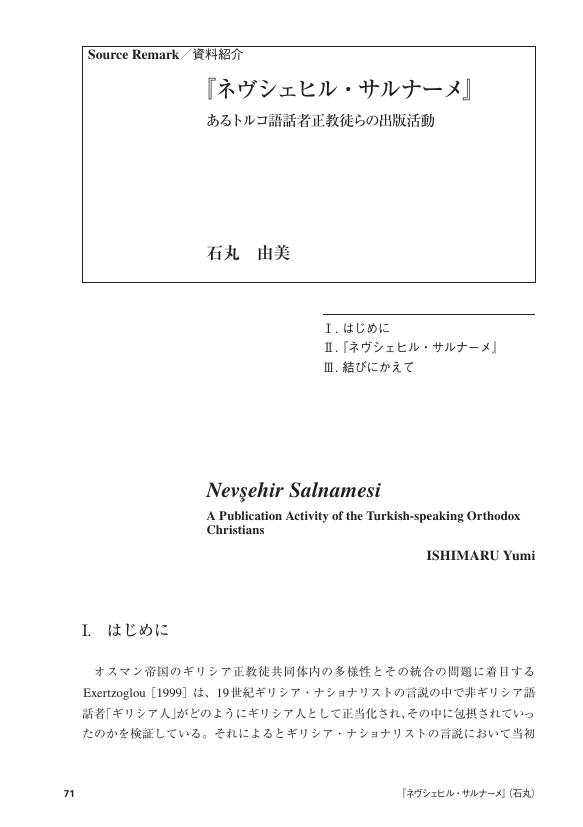8 0 0 0 OA オスマンルルックとアルバニア人 : 「オスマン国民」理念の受容の問題をめぐって
- 著者
- 石丸 由美
- 出版者
- 慶應義塾大学
- 雑誌
- 史学 (ISSN:03869334)
- 巻号頁・発行日
- vol.71, no.2, pp.209-227, 2002
論文I 問題の所在 1 はじめに 2 オスマン主義の限界 3 オスマンルルック(オスマン国民像)とシェムセッディン・サーミーII ルメリ情勢とサーミー : 東方連邦体制(beyet-i muctemie-i sarkiye)構想III アルバニア人とオスマン帝国 1 アルバニア人の位置付け 2 『テルジュマーヌ・ハキカット』紙(以下THと表記)からの反論 3 サーミーの「オスマン国民」像再考IV 結びにかえて
4 0 0 0 OA オスマン帝国ジャーナリズム事情 (1831-1908)
- 著者
- 石丸 由美
- 出版者
- 一般社団法人 日本オリエント学会
- 雑誌
- オリエント (ISSN:00305219)
- 巻号頁・発行日
- vol.34, no.2, pp.110-124, 1991 (Released:2010-03-12)
3 0 0 0 OA シェムセッティン・サーミーと『ハフタ』-文化的トルコ・ナショナリズムの源流-
- 著者
- 石丸 由美
- 出版者
- 一般社団法人 日本オリエント学会
- 雑誌
- オリエント (ISSN:00305219)
- 巻号頁・発行日
- vol.32, no.2, pp.14-29, 1989 (Released:2010-03-12)
Semseddin Sami, a famous journalist and philologist, is recognized as one of the nationalist intellectuals in the modern period of the Ottoman Empire. His activities and ideas are specified by two kinds of national consciousnesses; The one is Albanian identity, the other is Turkish identity.Originally he was an Albanian, born in Frasheri (now the town in Greece) in 1850, and so he was influenced by the Albanian movements for autonomy under the Ottoman rule.He started to develop his ideas of nation (kavim) after the Russo-Turkish war and the Berlin Treaty in 1878. By this treaty, the Albanian people's areas under the Ottoman rule were pressured to be divided by the surrounding Balkan states—Serbia, Montenegro and Greece, thereby he found it necessary to save the weakened Ottoman Empire from the foreign intrusions and then intended to awaken the national consciousnesses among the Ottoman peoples. From this point, we can say that his idea is a sort of Ottomanism.After finishing the high school, he came up to Istanbul and there he continued to undertake the editorial works of various periodicals, including the weekly newspaper Hafta publised in 1881. He gave a great importance to these jounalistic activities in order to enlighten the peoples and then to inform them of the knowledges of the progressive Western civilisation, especially those of modern technology that could save the deceased Ottoman Empire.In Hafta he maintained that each people (ethnic groupes), having their own languages, could become kavim (nation) within the Empire, and could have the political and cultural equality in the Ottoman nationality. He did not give more superiority to the Ottoman Turkish people (language) than to any other peoples (languages) in the Empire. He thought that the cultural development of each kavim by their own written languages would bring political and social stability to the Ottoman Empire. But unfortunately Sami's Ottomanism was not generally accepted by the intellectual elites of that period.
2 0 0 0 1911-1914年のトルコ文学に見られる日本人像と日本モデル
- 著者
- カラカルタル オウズ 石丸 由美
- 出版者
- 日本中東学会
- 雑誌
- 日本中東学会年報 (ISSN:09137858)
- 巻号頁・発行日
- no.6, pp.115-128, 1991-03-31
1 0 0 0 OA 『ネヴシェヒル・サルナーメ』 あるトルコ語話者正教徒らの出版活動
- 著者
- 石丸 由美
- 出版者
- 日本中東学会
- 雑誌
- 日本中東学会年報 (ISSN:09137858)
- 巻号頁・発行日
- vol.33, no.2, pp.71-90, 2018-01-15 (Released:2019-03-15)


